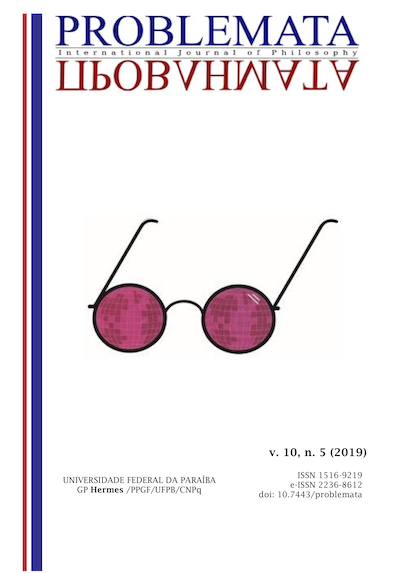TRAGEDY AND NATURE. A FRAGMENT OF HÖLDERLIN’S CORRESPONDENCE
DOI:
https://doi.org/10.7443/problemata.v10i5.49131Keywords:
Hölderlin, Tragedy, NatureAbstract
The article examines an epistle excerpt by Friedrich Hölderlin concerning the notion of Nature, having in sight the introduction of his conception of tragic. Such Hölderlin’s concept is, so, connected to those of Necessary and Whole, titles that found the metaphysical determination of Freedom. For the presentation of the proposed conceptual appropriation, it is observed, at first, Diderot’s position on dramatic arts, whose horizon seems to be aesthetic-pedagogical, being the natural conceived as a means and submitted to morals. Notes on the “necessary” concept, in Aristotle, are linked to the concept of Whole, and are used as connection to interprete Nature in the examined missive. If the latter is referred to the Whole, then human’s body and life are natural under the eyes of their pertaining to the first – the thruth of the organic, such as the unity of meaning of human life lies in the connection with Nature, conceived as metaphysical wholiness. The tragic wil be shown, therefore, as unifying dynamics of the Whole; and the tragedy, as the showing of this unity facing the rupture of the consigned meaning center of the “hero”.
Downloads
References
______. Poética. Tradução: Eudoro de Sousa. Lisboa: Imprensa Nacional – Casa da Moeda, 1986.
DASTUR, Françoise. “Hölderlin: Tragédia e Modernidade”. In HÖLDERLIN, Friedrich. Reflexões. Tradução: Márcia Cavalcante; Antonio Abranches. Rio de Janeiro: Relume Dumará, 1994. Pp. 145-214.
DIDEROT, Denis. “Paradoxo sobre o Comediante”. In Os Pensadores: Diderot. Tradução: J.Guinsburg. São Paulo: Abril Cultural, 1984.
HEIDEGGER, Martin. “Assim como em dia santo”. In Explicações da filosofia de Hölderlin. Tradução: Cláudia Drücker. Brasília: Editora UnB, 2013.
HÖLDERLIN, Friedrich. Correspondencia completa. Tradução: Helena C. Gabaudán; Arturo Leyte Coello. Madrid: Ediciones Hipérion, 1990.
______. Reflexões. Tradução: Márcia Cavalcante; Antonio Abranches. Rio de Janeiro: Relume Dumará, 1994.
______. Sämtliche Werke. 2.1. Stuttgart, 1951.
KANT, Immanuel. “Resposta à pergunta: Que é Esclarecimento?”. In Immanuel Kant: textos seletos. Tradução: Floriano de Sousa Fernandes. Petrópolis (TJ): Vozes, 1985.
MATTOS, Franklyn de. “A querela do teatro no século XVIII: Voltaire, Diderot, Rousseau”. In O que nos faz pensar. Revista de Filosofia. No. 25. Rio de Janeiro: PUC-Rio, 2009.
PRADO Jr., Bento. A retórica de Rousseau e outros ensaios. Tradução: Cristina Prado. São Paulo: Cosac e Naify, 2008.
SANTOS, Silvia Pereira. “Caminhos do drama burguês: de Diderot a Alexandre Dumas filho”. In Darandina, Revista eletrônica. Vol.02. No. 02. Juiz de Fora (MG): Universidade Federal de Juiz de Fora, 2009. Disponível em http://www.ufjf.br/darandina/files/2010/02/artigo20a.pdf Acessado em 13/11/2019.
SOUZA, Maria das Graças de. Natureza e Ilustração. Sobre o materialismo de Diderot. São Paulo: Editora UNESP, 2202.
WERLE, Marco Aurélio. Poesia e pensamento em Hölderlin e Heidegger. São Paulo: Editora UNESP, 2005.
Downloads
Published
Issue
Section
License
Authors who publish with this journal agree to the following terms:
- Authors retain copyright and grant the journal right of first publication with the work simultaneously licensed under a Creative Commons Attribution License that allows others to share the work with an acknowledgement of the work's authorship and initial publication in this journal.
- Authors are able to enter into separate, additional contractual arrangements for the non-exclusive distribution of the journal's published version of the work (e.g., post it to an institutional repository or publish it in a book), with an acknowledgement of its initial publication in this journal.
-
- Authors are permitted and encouraged to post their work online (e.g., in institutional repositories or on their website) prior to and during the submission process, as it can lead to productive exchanges, as well as earlier and greater citation of published work (See The Effect of Open Access).





